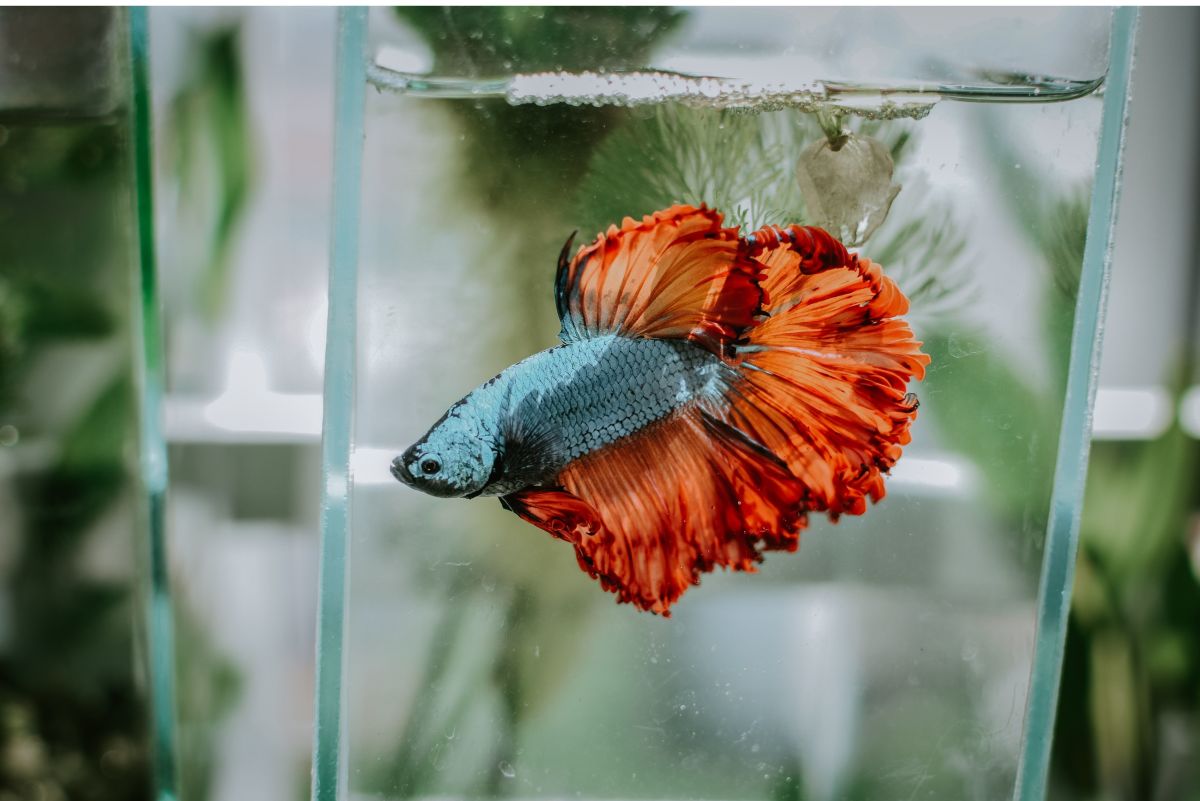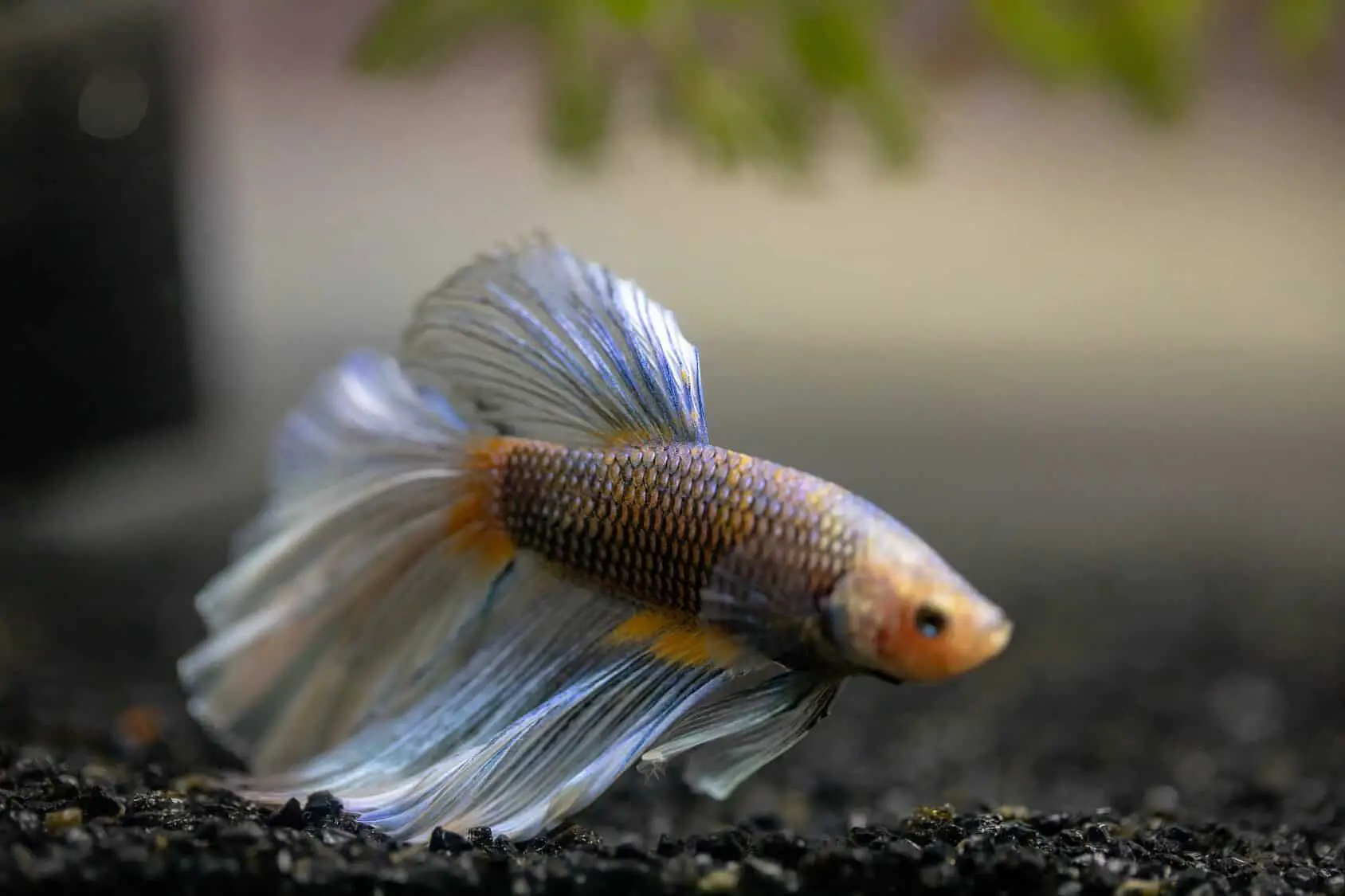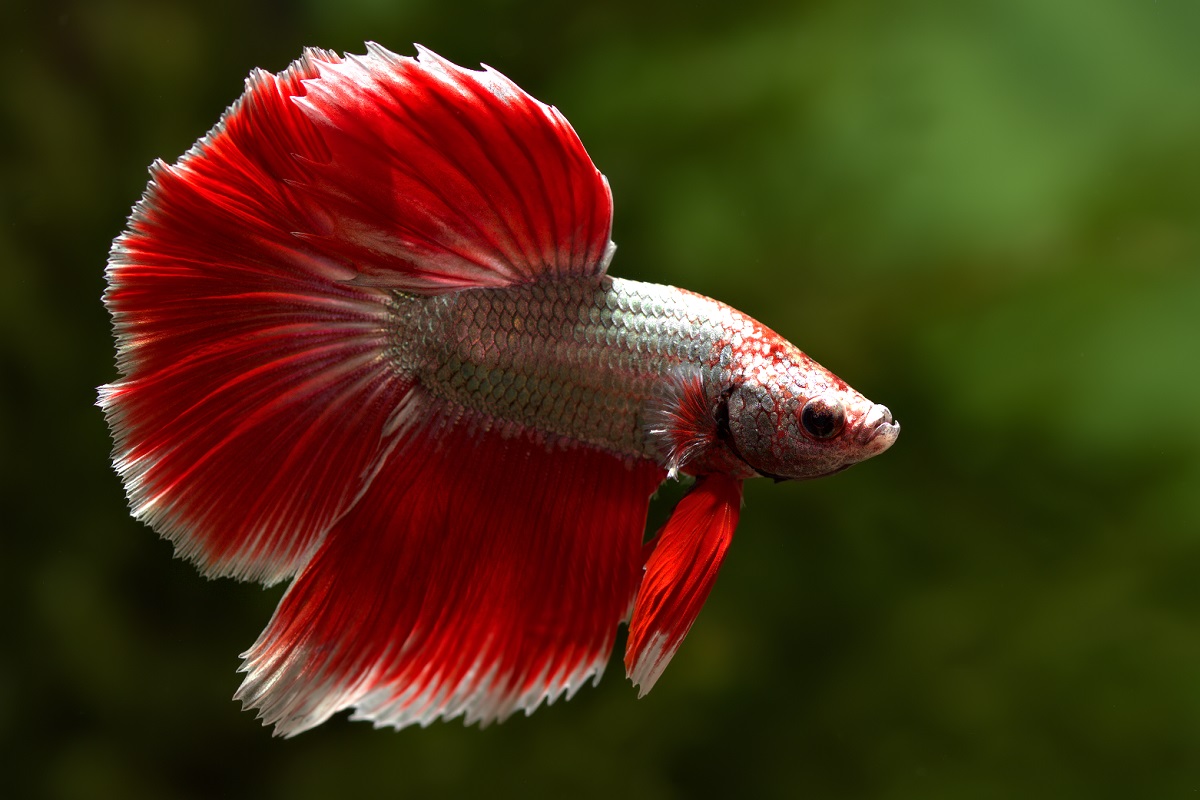Maxwell Adams is a veterinarian specializing in aquatic pets. His medical expertise and compassionate approach to pet care make his articles a valuable resource for Betta Fisher's readers.
As a passionate betta fish enthusiast, you understand the importance of providing optimal care for your aquatic pet. Betta fish, with their vibrant colors and unique personalities, are not just pets, but companions who bring joy and tranquility to our lives. But did you know that your betta's health and well-being directly depend on the care you provide? That's why it's crucial to follow the best practices for betta fish care, creating the perfect betta tank setup that closely mimics their natural habitat in the wild.
Betta fish are native to the warm, shallow waters of Southeast Asia, where they live in rice paddies, ponds, and slow-moving streams. This natural habitat of the betta fish in the wild is lush with vegetation, providing plenty of hiding spots. It's a world far removed from the small, often barren containers in which betta fish are commonly kept. So, how can we recreate this environment in a home aquarium? And how to set up a fish tank for betta that promotes their health and longevity? You can learn more about this in our guide on choosing the right plants for your betta fish tank.
Understanding the natural behavior and needs of your betta fish is the first step towards creating an environment where they can thrive. Betta fish are solitary creatures, often aggressive towards their own kind. They are also labyrinth fish, meaning they can breathe air and require access to the surface. They are known for their vibrant colors, long flowing fins, and a lifespan that can reach up to five years in captivity with proper care. The key to a long, healthy life for your betta fish lies in mimicking their natural habitat as closely as possible in your home aquarium. You can learn more about their behavior and needs in our comprehensive guide to owning a betta fish.
Setting up the ideal betta tank involves considering several factors, including tank size, heating, filtration, and decoration. A small bowl might seem like a convenient choice, but it's far from the best betta fish tank setup. Betta fish need space to swim and explore. A tank that's too small can lead to stress and health problems. So, what's the optimal betta fish tank setup? Stay tuned as we delve deeper into this topic in the next section. For more information, check out our guide on setting up your betta fish tank.
Diving Deep into the World of Betta Fish 🐠: Their Natural Habitat and Behavior
Understanding the nature of betta fish is crucial to providing them with the best care possible. So, let's take a moment to explore where wild betta fish live and what their natural habitat looks like. Betta fish, also known as Siamese fighting fish, are native to the warm, shallow waters of Thailand, Cambodia, and Vietnam. They often inhabit rice paddies, marshes, and slow-moving streams. This environment is rich in vegetation, providing betta fish with plenty of hiding spots and territories to claim.
Why is this information important, you might ask? Well, it helps us create an optimal betta fish tank setup that closely mimics their natural habitat. This is a key aspect of our betta fish care guide, as it contributes significantly to the health and longevity of your betta fish.
Speaking of longevity, betta fish typically live between 3 to 5 years in captivity when given proper care. However, some bettas have been known to live up to 7 years! Their lifespan can be influenced by several factors, including diet, tank conditions, and overall health care.
Now, let's talk about their behavior. Betta fish are known for their vibrant colors, large, flowing fins, and unique personality traits. They are solitary creatures, often displaying territorial behavior, especially the males. They can also be quite interactive, showing curiosity towards their surroundings and even their human caretakers. Isn't that fascinating?
Understanding their natural habitat, lifespan, and behavior is the first step towards providing the best practices for betta fish care. By knowing where they come from and what they need, we can create a perfect betta tank setup that not only keeps them healthy but also allows them to exhibit their natural behaviors. So, are you ready to dive deeper into the world of betta fish care? Let's explore the ideal conditions for your betta fish tank next.
Creating the Perfect Betta Fish Paradise 🏝️: Best Practices for Tank Setup
Creating a perfect betta fish tank setup is not just about aesthetics; it's about mimicking the natural habitat of betta fish in the wild. This is crucial for their health and well-being. So, what does the ideal betta tank setup look like?
Firstly, size matters. Betta fish are active swimmers and need space to thrive. A tank of at least 5 gallons is recommended. Larger tanks are even better, as they provide more room for swimming and exploration, replicating the betta fish habitat in the wild. Remember, a happy betta is an active betta!
Next, let's talk about heating. Betta fish are tropical creatures, hailing from the warm waters of Thailand. They prefer temperatures between 78 and 80 degrees Fahrenheit. A reliable, adjustable aquarium heater is a must to maintain these temperatures. Consistent heating not only keeps your betta comfortable but also supports their immune system.
Filtration is another essential aspect of the best betta fish tank setup. Betta fish, like all fish, produce waste that can pollute their water. A good filter will help keep the water clean and safe. However, betta fish aren't strong swimmers, so choose a filter that doesn't create a strong current. Can you imagine trying to swim against a strong current all day? Your betta fish wouldn't appreciate it either!
Finally, decorations aren't just for show. They serve a functional purpose too. In the wild, betta fish live in environments rich with plants and hiding spots. Providing these in your tank setup will help your betta feel secure and entertained. Opt for silk or live plants over plastic ones, which can harm your betta's delicate fins. Also, include caves or other hiding places for your betta to retreat to when they need a break.
By incorporating these best practices for betta fish care into your tank setup, you'll create an environment that closely resembles the natural habitat of betta fish in the wild. This will not only make your betta fish happier but also contribute to their overall health and longevity. Isn't that what we all want for our aquatic friends?

Feeding Frenzy 🍽️: What's on the Menu for Betta Fish?
Just as you and I thrive on a balanced diet, so do our betta fish friends. Betta fish are primarily carnivorous, and in their natural habitat, they feed on insects and small crustaceans. Therefore, a diet rich in animal proteins is essential for their health and vibrancy. Learn more about the dietary needs of Betta fish.
Quality betta fish pellets are a great starting point. These pellets are specially formulated to provide your betta with the nutrients they need. However, variety is the spice of life, isn't it? To mimic the diverse diet of betta fish in the wild, consider supplementing the pellets with live or frozen foods such as brine shrimp, bloodworms, and daphnia. These treats not only add variety to your betta's diet but also encourage natural hunting behaviors, keeping your fish mentally stimulated and happy.
Now, you might be wondering, "How often should I feed my betta fish?" A good rule of thumb is to feed your betta fish once or twice a day, giving them only as much food as they can consume in a few minutes. Overfeeding can lead to health issues like obesity and constipation, and it can also dirty the tank water quickly, creating an unhealthy environment for your betta. So, remember, moderation is key! Learn more about maintaining clean and safe water for your fish.
Understanding and respecting your betta's dietary needs is a crucial part of providing optimal care. With the right diet, your betta fish can live a healthy, happy life, displaying the vibrant colors and active behavior that make them such a joy to keep. Isn't it wonderful to know that you have the power to provide such a positive impact on your betta's life? Discover more tips on how to take care of a betta fish.

Keep Your Betta Happy and Healthy 🐟: Routine Care Essentials
Just as we thrive in a clean, healthy environment, so do our betta fish friends. Regular water changes are a cornerstone of optimal betta fish care. Imagine being cooped up in a room full of stale, dirty air. Not very pleasant, right? That's how your betta fish feels in a tank with old, unclean water. Therefore, it's crucial to replace about 25% of the tank water with fresh, dechlorinated water every week. This practice helps to eliminate waste and toxins, ensuring your betta fish has a clean and healthy home to swim in.
But it's not just about cleanliness. The water parameters in your betta fish tank setup need to be just right. Betta fish are tropical creatures, native to the warm, slightly acidic waters of Thailand's rice paddies. To replicate their natural habitat, you should maintain the water temperature between 76 to 80 degrees Fahrenheit. The pH should be kept between 6.5 and 7.5 to mimic the slightly acidic conditions of their wild habitat. Regularly testing the water parameters is essential to ensure they are within these ideal ranges.
Now, let's talk about your betta fish's health. Just like any other pet, betta fish can fall ill. It's important to monitor your betta fish daily for any signs of illness. Is your betta fish eating well? Is it swimming normally or hiding at the bottom of the tank? Does it have bright, vibrant colors or are they starting to fade? These are all things you should be looking out for. Early detection of health issues can make a big difference in your betta fish's recovery.
Remember, providing the best care for your betta fish isn't just about keeping them alive. It's about creating an environment where they can thrive and display their beautiful, vibrant colors and lively personalities. With a little effort and dedication, you can ensure your betta fish lives a long, happy, and healthy life.
Betta Health Watch 👀: Common Issues and Signs to Look Out For
As a passionate betta fish keeper, it's crucial to understand that these beautiful creatures can sometimes encounter health issues, just like any other pet. The key to maintaining your betta fish's health lies in early detection and prompt treatment. So, what are some common health problems that bettas may face, and what signs should you watch out for?
One common issue is fin rot, a bacterial infection that can cause your betta's fins to look ragged and torn. This is often a result of poor water quality or stress. If you notice your betta's fins looking less than perfect, it's time to check your tank conditions and consider a water change.
Another common health problem is Swim Bladder Disease, which can cause your betta to have difficulty swimming or even float upside down. This can be caused by overfeeding or feeding your betta the wrong type of food. If your betta is showing these symptoms, you might want to reassess their diet and feeding practices.
Ich, also known as White Spot Disease, is a parasitic infection that can cause small white spots on your betta's body and fins. It can be highly contagious, so it's essential to isolate the affected fish and treat the entire tank to prevent the spread.
Lastly, dropsy is a serious condition that can cause your betta's body to swell due to fluid accumulation. It's often a sign of internal organ failure and requires immediate veterinary attention.
Remember, the best betta fish care guide will always emphasize the importance of prevention over cure. By providing the best betta fish tank setup, maintaining optimal water conditions, and feeding a balanced diet, you can significantly reduce the likelihood of these issues arising. But if they do, early detection and prompt treatment can make all the difference.
Isn't it fascinating how much we can do to ensure the well-being of these small, vibrant creatures? By understanding their needs and providing the perfect betta tank setup, we can create a little slice of their natural habitat right in our homes. And in return, we get to enjoy their captivating beauty and unique personalities. Truly, the joy of betta fish keeping is unparalleled.

The Rewarding Journey of Betta Fish Keeping 🎁: More Than Just a Hobby
Embarking on the journey of betta fish keeping is not just a hobby, it's a commitment to a living being that relies on you for its well-being. But with the right knowledge and practices, it can be an incredibly rewarding experience. The vibrant colors, the unique personalities, and the serene beauty bettas bring to your space are truly unmatched.
Remember, the best practices for betta fish care start with understanding their natural habitat in the wild. This knowledge guides us in creating the perfect betta tank setup that mimics their wild environment, providing them with a comfortable and stimulating home. The ideal betta tank setup should be spacious, heated, and well-filtered, with plenty of places to hide and explore.
Feeding your betta a varied diet is also crucial. Just like us, bettas thrive on a balanced diet. Offering them a mix of high-quality pellets, live foods, and occasional treats will help ensure they get all the nutrients they need.
Regular water changes and monitoring of water parameters are essential in maintaining a healthy environment for your betta. It's also important to keep an eye on your betta's behavior and physical appearance. Any changes could be a sign of health issues and should be addressed promptly. Understanding betta fish sleep patterns can also be a useful indicator of their overall health.
But perhaps the most rewarding part of betta fish keeping is the bond you develop with your pet. Watching them swim around their tank, interact with their environment, and even recognize you can be a source of endless joy and fascination.
So, are you ready to dive into the world of betta fish keeping? With this betta fish care guide, you're well-equipped to provide your betta with a happy and healthy life. Remember, the key to successful betta fish keeping lies in understanding their needs and meeting them with love and care. And when you do, you'll find that the rewards are well worth the effort.















